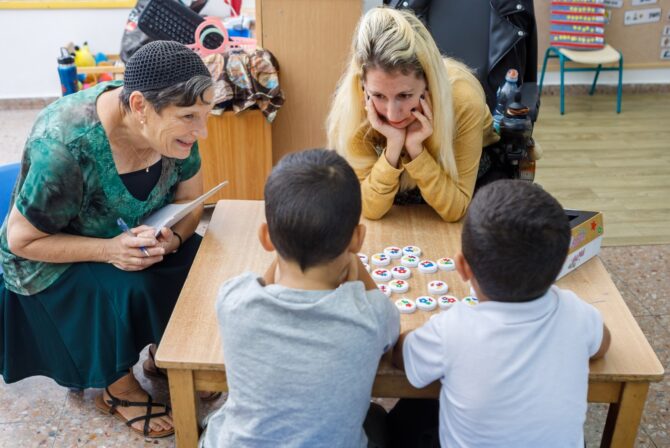“Abba, what are those doors up there?”
“I’m not sure, I think it is some kind of a fence.”
“Can we go visit them?”
“No not tonight, sweetie, we are going home now.”
We are driving back from Tzur Hadassah, a suburb of Jerusalem within the Green Line (which separates Israel and the Palestinian territories). The quickest route back into Jerusalem (and into the beds of our two sleepy children) is past Betar Illit and kvish haminharot, the “tunnel road” which connects Jerusalem to the Gush Etzion bloc in the West Bank.
The “doors” my son is referring to are concrete slabs that are suspended overhead at an angle to protect passing cars from stoning and shooting by local Arab villagers.
“Why are there all the policemen, Abba?”
They are soldiers at two checkpoints actually. One that we pass to leave Israel proper and the other we pass through to re-enter.
“We are going inside and outside of Israel, sweetie.”
“Why are they carrying guns?”
Our 4-year-old is obsessed with guns and all other kinds of weapons. While we don’t allow any in the house, he easily turns his fiddlesticks into bows and arrows, and a shower rod into a sword. He likes to be protected from the “bad guys” at every turn.
“To protect us and to make sure that the bad guys don’t hurt anyone.”
“Do they use them?”
“I don’t think they do; maybe they would fire a shot on the ground to scare a bad guy.”
The conversation makes me realize just how much our son, Tamir, is taking in and trying to make sense of the world around him. He loves Israel and he loves Jerusalem, in the ways that any classical Zionist would be proud. His new favorite color is gold because “Imma, Jerusalem is the Golden city!” He then launches into a version of
Yerushalayim Shel Zahav
that only approximates what Naomi Shemer had in mind. He wakes up a week into our month-long trip here imploring, “Imma, can we go to the Kotel (Western wall) today, please?” And he points out all the “Tamir trees” (date-palm trees) that line the Jerusalem streets. In short, he feels at home here.
His feelings echo my own. I lived here for 10 years after college, made aliyah (immigrated), and hold Israeli citizenship. I love how normal it is to be Jewish here, I love the quiet that falls over Jerusalem on Friday afternoon, and the siren that sounds over an even quieter city to announce that Shabbat has arrived. I love how the Hebrew language is alive and that the Jewish calendar makes sense here (a few days after Tu Bishvat, the shkadiot or almond trees are in full bloom).
But now I have the added lens of seeing Israel through my children’s eyes. If we were to move back here, the army is a reality, the student-teacher ratio is a lot higher here than in schools they would attend in the States, and the threat of war looms over every family’s shoulder.
Watching Tamir think about the external signs of danger (soldiers, checkpoints, guns) melts my heart. How do his big inquisitive eyes make sense of these fixtures of war with the beauty he is growing to love? Is it responsible for me to even consider moving back to a country in which army service is mandatory and is objectively more dangerous than our quiet village on the East end of Long Island?
Whenever I have these kinds of big existential questions, I do what any self respecting mother does–I call my girlfriends who live here to find out how they have come to terms with some of what I am feeling and noticing.
Denial: When you read about news in Israel from the States it seems like a pretty scary place. Just today there was a “test siren” that sounded throughout Jerusalem to prepare the public to find the nearest bomb shelter in the event that there is an air strike from Gaza/Syria/Iran or any other threat to Israel du jour. But the way most people dealt with it was to treat it lightly. Denying the real threat of danger enables Israelis to go about their daily lives–to go to work, sit in cafes, and cook dinner for their children without paying too much attention to the real danger of living here.
Acceptance and normalization: And on the other side, there is an acceptance that danger, pain, and loss are all a part of life. Army service is just “what kids do” after high school, as opposed to a choice that might not meet parental approval. (I am reminded of an American Jewish parent who told me he never intervened in his son’s life as stridently as when he opposed his son’s interest in signing up for ROTC.) The passion for living fully comes from the recognition of the dangers of life, not in spite of them.
As I am about to have my third child, the message from Yehudit Ravitz’s lullaby, Bakh Lo Nogaya (Nothing can touch you) speaks to me the most. With full recognition that this world (and Israel in particular) is a dangerous place, for me, I think I will continue to believe in the power of my own ability to protect my children while gently letting the sometimes harsh realities of life seep in.
Bakh lo nogaya–Nothing will Touch You
Yehudit Ravitz
There are big bears in the forest
And palpable fear
There are dances opposed fire
And snakes and owls.
There are monsters in the river
Hungry and awake
But your room is warm and nice
And you are asleep.
The breath of the mouths of innocents
Are quiet and calm
Nothing scares you and
Nothing will harm you
There’s a war in the middle ofEurope
These are black days.
Caravan flees without a home
Because of the bad people
There’s a crazy virus that harms
Indiscriminately
But this room is warm and nice
And you are sleeping.
The mouths of innocent
Are quiet and calm
Nothing scares you and
Nothing will harm you.
For more on modern Israel, read these tips for talking to your kids about conflict in the Middle East, one mother’s reaction to the recent war where she lives, and thoughts on the protests of Women of the Wall.







